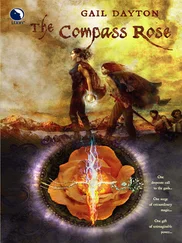Ursula Le Guin - The Compass Rose
Здесь есть возможность читать онлайн «Ursula Le Guin - The Compass Rose» весь текст электронной книги совершенно бесплатно (целиком полную версию без сокращений). В некоторых случаях можно слушать аудио, скачать через торрент в формате fb2 и присутствует краткое содержание. Жанр: Фантастика и фэнтези, на английском языке. Описание произведения, (предисловие) а так же отзывы посетителей доступны на портале библиотеки ЛибКат.
- Название:The Compass Rose
- Автор:
- Жанр:
- Год:неизвестен
- ISBN:нет данных
- Рейтинг книги:3 / 5. Голосов: 1
-
Избранное:Добавить в избранное
- Отзывы:
-
Ваша оценка:
- 60
- 1
- 2
- 3
- 4
- 5
The Compass Rose: краткое содержание, описание и аннотация
Предлагаем к чтению аннотацию, описание, краткое содержание или предисловие (зависит от того, что написал сам автор книги «The Compass Rose»). Если вы не нашли необходимую информацию о книге — напишите в комментариях, мы постараемся отыскать её.
From dream worlds to nightmare planets, through mazes of madness to tiny time holes in space, down Pathways of Desire to a New Atlantis, THE COMPASS ROSE points the way to the wonder-filled mind-country of a remarkable writer.
"As good as any contemporary at creating worlds, imaginary or our own… Le Guin writes with painstaking intelligence. Her characters are complex and haunting, and her writing is remarkable for it's sinewy grace."
—TIME Magazine
The Compass Rose — читать онлайн бесплатно полную книгу (весь текст) целиком
Ниже представлен текст книги, разбитый по страницам. Система сохранения места последней прочитанной страницы, позволяет с удобством читать онлайн бесплатно книгу «The Compass Rose», без необходимости каждый раз заново искать на чём Вы остановились. Поставьте закладку, и сможете в любой момент перейти на страницу, на которой закончили чтение.
Интервал:
Закладка:
We saw our first iceberg much farther south than we had looked for it, and saluted it with Veuve Clicquot at dinner. The next day we entered the ice pack, the belt of floes and bergs, broken loose from the land ice and winter-frozen seas of Antarctica, which drifts northward in the spring. Fortune still smiled on us: our little steamer, incapable, with her unreinforced metal hull, of forcing a way into the ice, picked her way from lane to lane without hesitation, and on the third day we were through the pack, in which ships have sometimes struggled for weeks and been obliged to turn back at last. Ahead of us now lay the dark grey waters of the Ross Sea, and beyond that, on the horizon, the remote glimmer, the cloud-reflected whiteness of the Great Ice Barrier.
Entering the Ross Sea a little east of Longitude West 160°, we came in sight of the Barrier at the place where Captain Scott’s party, finding a bight in the vast wall ofice, had gone ashore and sent up their hydrogen-gas balloon for reconnaissance and photography. The towering face of the Barrier, its sheer cliffs and azure and violet water-worn caves, all were as described, but the location had changed: instead of a narrow bight there was a considerable bay, full of the beautiful and terrific orca whales playing and spouting in the sunshine of that brilliant southern spring.
Evidently masses of ice many acres in extent had broken away from the Barrier (which—at least for most of its vast extent—does not rest on land but floats on water) since the Discovery’s passage in 1902. This put our plan to set up camp on the Barrier itself in a new light; and while we were discussing alternatives, we asked Captain Pardo to take the ship west along the Barrier face towards Ross Island and McMurdo Sound. As the sea was clear of ice and quite calm, he was happy to do so, and, when we sighted the smoke plume of Mount Erebus, to share in our celebration—another half case of Veuve Clicquot.
The Yelcho anchored in Arrival Bay, and we went ashore in the ship’s boat. I cannot describe my emotions when I set foot on the earth, on that earth, the barren, cold gravel at the foot of the long volcanic slope. I felt elation, impatience, gratitude, awe, familiarity. I felt that I was home at last. Eight Adélie penguins immediately came to greet us with many exclamations of interest not unmixed with disapproval. “Where on earth have you been? What took you so long? The Hut is around this way. Please come this way. Mind the rocks!” They insisted on our going to visit Hut Point, where the large structure built by Captain Scott’s party stood, looking just as in the photographs and drawings that illustrate his book. The area about it, however, was disgusting—a kind of graveyard of seal skins, seal bones, penguin bones, and rubbish, presided over by the mad, screaming skua gulls. Our escorts waddled past the slaughterhouse in all tranquillity, and one showed me personally to the door, though it would not go in.
The interior of the hut was less offensive, but very dreary. Boxes of supplies had been stacked up into a kind of room within the room; it did not look as I had imagined it when the Discovery party put on their melodramas and minstrel shows in the long winter night. (Much later, we learned that Sir Ernest had rearranged it a good deal when he was there just a year before us.) It was dirty, and had about it a mean disorder. A pound tin of tea was standing open. Empty meat tins lay about; biscuits were spilled on the floor; a lot of dog turds were underfoot—frozen, of course, but not a great deal improved by that. No doubt the last occupants had had to leave in a hurry, perhaps even in a blizzard. All the same, they could have closed the tea tin. But housekeeping, the art of the infinite, is no game for amateurs.
Teresa proposed that we use the hut as our camp. Zoe counterproposed that we set fire to it. We finally shut the door and left it as we had found it. The penguins appeared to approve, and cheered us all the way to the boat.
McMurdo Sound was free of ice, and Captain Pardo now proposed to take us off Ross Island and across to Victoria Land, where we might camp at the foot of the Western Mountains, on dry and solid earth. But those mountains, with their storm-darkened peaks and hanging cirques and glaciers, looked as awful as Captain Scott had found them on his western journey, and none of us felt much inclined to seek shelter among them.
Aboard the ship that night we decided to go back and set up our base as we had originally planned, on the Barrier itself. For all available reports indicated that the clear way south was across the level Barrier surface until one could ascend one of the confluent glaciers to the high plateau which appears to form the whole interior of the continent. Captain Pardo argued strongly against this plan, asking what would become of us if the Barrier “calved”—if our particular acre of ice broke away and started to drift northward. “Well,” said Zoe, “then you won’t have to come so far to meet us.” But he was so persuasive on this theme that he persuaded himself into leaving one of the Yelcho’s boats with us when we camped, as a means of escape. We found it useful for fishing, later on.
My first steps on Antarctic soil, my only visit to Ross Island, had not been pleasure unalloyed. I thought of the words of the English poet:
Though every prospect pleases,
And only Man is vile.
But then, the backside of heroism is often rather sad; women and servants know that. They know also that the heroism may be no less real for that. But achievement is smaller than men think. What is large is the sky, the earth, the sea, the soul. I looked back as the ship sailed east again that evening. We were well into September now, with ten hours or more of daylight. The spring sunset lingered on the twelve-thousand-foot peak of Erebus and shone rosy gold on her long plume of steam. The steam from our own small funnel faded blue on the twilit water as we crept along under the towering pale wall of ice.
On our return to “Orca Bay”—Sir Ernest, we learned years later, had named it the Bay of Whales—we found a sheltered nook where the Barrier edge was low enough to provide fairly easy access from the ship. The Yelcho put out her ice anchor, and the next long, hard days were spent in unloading our supplies and setting up our camp on the ice, a half kilometer in from the edge: a task in which the Yelcho ’s crew lent us invaluable aid and interminable advice. We took all the aid gratefully, and most of the advice with salt.
The weather so far had been extraordinarily mild for spring in this latitude; the temperature had not yet gone below -20° Fahrenheit, and there was only one blizzard while we were setting up camp. But Captain Scott had spoken feelingly of the bitter south winds on the Barrier, and we had planned accordingly. Exposed as our camp was to every wind, we built no rigid structures above ground. We set up tents to shelter in while we dug out a series of cubicles in the ice itself, lined them with hay insulation and pine boarding, and roofed them with canvas over bamboo poles, covered with snow for weight and insulation. The big central room was instantly named Buenos Aires by our Argentineans, to whom the center, wherever one is, is always Buenos Aires. The heating and cooking stove was in Buenos Aires. The storage tunnels and the privy (called Punta Arenas) got some back heat from the stove. The sleeping cubicles opened off Buenos Aires, and were very small, mere tubes into which one crawled feet first; they were lined deeply with hay and soon warmed by one’s body warmth. The sailors called them “coffins” and “wormholes,” and looked with horror on our burrows in the ice. But our little warren or prairie-dog village served us well, permitting us as much warmth and privacy as one could reasonably expect under the circumstances. If the Yelcho was unable to get through the ice in February, and we had to spend the winter in Antarctica, we certainly could do so, though on very limited rations. For this coming summer, our base—Sudamerica del Sur, South South America, but we generally called it the Base—was intended merely as a place to sleep, to store our provisions, and to give shelter from blizzards.
Читать дальшеИнтервал:
Закладка:
Похожие книги на «The Compass Rose»
Представляем Вашему вниманию похожие книги на «The Compass Rose» списком для выбора. Мы отобрали схожую по названию и смыслу литературу в надежде предоставить читателям больше вариантов отыскать новые, интересные, ещё непрочитанные произведения.
Обсуждение, отзывы о книге «The Compass Rose» и просто собственные мнения читателей. Оставьте ваши комментарии, напишите, что Вы думаете о произведении, его смысле или главных героях. Укажите что конкретно понравилось, а что нет, и почему Вы так считаете.




